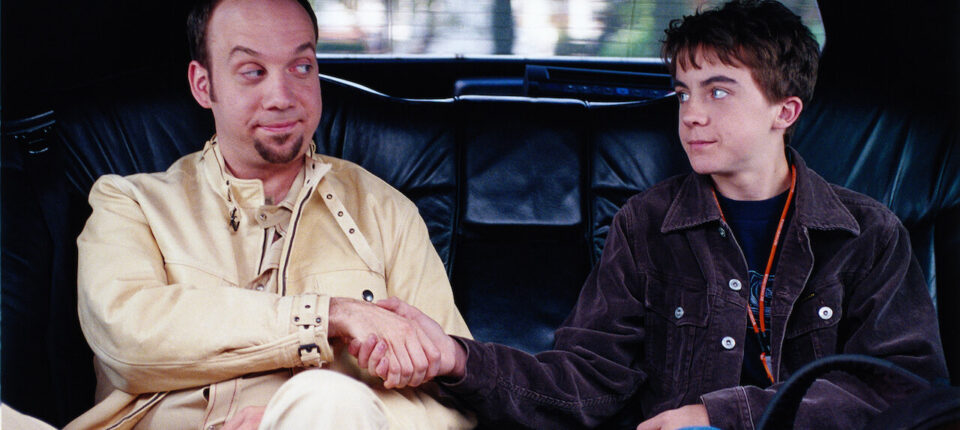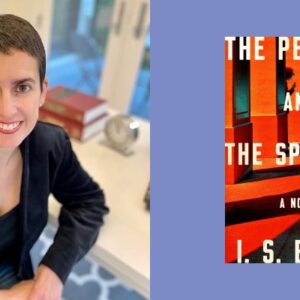Recently, Paul Giamatti received an Oscar nomination for his performance in The Holdovers—Alexander Payne’s period film about three loners stuck at a boys’ boarding school during holiday break. He was previously nominated for a supporting role in Cinderella Man in 2005. Many, including myself, are still enraged that he was not nominated for his expressive and powerful performance in Sideways, Payne’s 2004 dark comedy about two friends who go on a trip to wine country and wind up reckoning with their lives and choices.
But allow me to suggest that Giamatti, an actor of boundless talent and irrepressible commitment, should have received his first Oscar nomination in 2002, for a performance in a Nickelodeon Studios kids’ movie called Big Fat Liar.
Half of the people reading this will automatically agree. You know what I mean. You will remember. The other half of you won’t know what I’m talking about at all. To this half of you, I ask… nay, I beg: hear me out. HEAR me out.
“Big Fat Liar. B.F.L. Bfl, as it’s come to be known.” The film is a cornerstone in the cinematic repertoire of persons who subliminally know the back half of the phrase that begins “call me, beep me,” who remember the Rachel McAdams-Ryan Gosling kiss at the MTV Movie Awards, who can recall seeing purple and green Heinz EZ Squirt bottles in the supermarket. In other words, the youngest millennials and the eldest zoomers.
What’s it about? Everything. It’s the kind of splashy, kid-friendly studio fare that they don’t make anymore: a hilarious, grandiose adventure about two wiseass kids, and it’s also (like many movies aimed at kids from that era), a tribute to great movies from the 20th century.
Frankie Muniz (2002, baby!) is a fourteen-year-old kid named Jason Shepherd. He lives in a nice Michigan suburb, skateboards to school, hangs out with his best friend Kaylee (Amanda Bynes). But he also complicates his blissful existence by lying constantly, using his silver-tongued gift of gab to slide around the rules, get himself out of undesirable situations, and ultimately… wind up in big, big trouble.
Our story, which was directed by Shawn Levy, begins when Jason fibs to get out of handing in a school paper but gets caught in the lie. He’s given a very, very brief extension of a few hours from his teacher (Sandra Oh), and is hit with a stroke of genius. He begins to pen (furiously, due to the time-limit) a short story about a compulsive liar and the trouble it gets him in, which he calls “Big Fat Liar.” He names the main character after his dog. It’s all very ad-hoc. And it’s full of intriguing framing language like, “Kenny Trooper was the world’s biggest liar… they say a little lie can grow bigger and bigger… one man will pay the price.” If it sounds to you like the tagline to a movie or the VO in a trailer, then you’re thinking right. Let’s keep going.
So! As Jason is biking to the meeting place to hand it in, he is hit by a car! Yes! Well, actually, it’s a limo. And the passenger of this limo, a Hollywood producer named Marty Wolf (Giamatti), agrees, very, very unhappily, to give him a ride the rest of the way. As Jason and Marty chat for a bit in the backseat, his backpack spills and the story falls out without him knowing. After Jason leaves, Marty picks it up and gives it a quick read, growing visibly intrigued (you can tell by the slow arching of Giamatti’s eyebrow). And Jason shows up to meet his teacher without it, frantically telling a wild story about getting hit by a limo driving a Hollywood producer who accidentally took his paper. No one believes him, he fails his class, and he is sentenced to summer school.
It’s only when he’s at the movies with Kaylee does he see a teaser for a movie with the same plot and title as his paper, causing him to realize that Wolf had stolen his story and has begun adapting it into a big feature, next summer’s eagerly-anticipated blockbuster. Yet, still no one will believe Jason about what happened, so he convinces Kaylee to run away to Los Angeles with him for a long weekend while his parents are out of town. He plans on cornering Wolf at his studio and getting him to admit that he plagiarized his next big feature film. Only, Big Fat Liar is poised to be Marty’s biggest hit in a long, long time, and he doesn’t plan on letting go of it.
Big Fat Liar is probably the first time my generation even saw Paul Giamatti. Maybe some of us did see him in small roles beforehand; we might have seen him as the bellman in My Best Friend’s Wedding (1997), or watched as he played the orangutan Limbo in Planet of the Apes (2001), unrecognizable in pounds of makeup. There were always one or two kids in my elementary school classes who bragged about being allowed to watch Saving Private Ryan (1998) so maybe some of them caught him in that movie, too.
But it’s not only appealing to kids—rather, the kids we were in 2002. In the twenty-plus years since, my own father has always been compelled to stop flipping through channels every time he sees Big Fat Liar playing. He watches it through to the end, every time, and his loud belly laughs echo through the house.
Critics will say that movies like American Splendor (2002) and the aforementioned Sideways made him the star he is now. But Big Fat Liar proved, early on, that he could do anything. Giamatti seems to have thrown his whole heart into this one, playing the obnoxious, perfidious, sneaky, general all-around jerk Wolf with a level of manic energy heretofore unseen in man. He is… incredible. He is far more committed to his role than anyone in this genre of movie need be and, as a result, he makes the whole enterprise cohere. He’s never so abominable that he’s unwatchable; in fact, the deeper Giamatti burrows into his unpleasantness, the more compelling he becomes. The intensity of performance is not merely funny, but it is also a clever exaggeration of the sinister Hollywood producer archetype we’ve seen a thousand times before.
Giamatti told GQ in an interview in December 2023 that he enjoyed the chance to do the “crazy physical stuff” that the role of Marty Wolf required. “I’ve always been physically comfortable doing stuff like that in front of people. I mean, there’s obviously an exhibitionist element to actors… he just was letting me do so much ridiculous stuff and I enjoy being big like that. It’s really fun, you know? You don’t get the opportunity so much to just go over the top like that. And [the director, Shawn Levy] knew I could.” Levy was a college friend of Giamatti’s and apparently hounded him to take the part. Honestly, has anyone been a better judge of ability than Shawn Levy in this moment? I say nay.
Marty’s personality develops across two acts: his normal state of unprincipled megalomania, unhinged unpleasantness, and petty tyranny at his production company offices and on sets, and a state of frantic, tantrum-happy acrimony as Jason turns the tables and begins to ruin his life, in the form of a series of vengeful pranks by Jason, Kaylee, and the small army they have gathered from the pool of his employees and colleagues. Throughout, though, he is a magnetic antagonist, a showstopping villain, combining vocal mayhem and madcap physicality.
A perfect example is the film’s (perhaps) most memorable scene, when the obnoxious Marty wakes up one morning in his ostentatious Los Angeles mansion and dances his way to his pool, grooving along to his favorite song, Duran Duran’s “Hungry Like the Wolf.” He doesn’t realize, though, that Jason and Kaylee have dumped out bottles of blue dye in his pool, poured orange hair dye in his shampoo, and dabbed wet superglue inside his phone earpiece. During this single two-minute scene, we see the extremes of Marty’s existence: a narcissistic tyrant at the height of his power and an angry bully who realizes someone’s getting the better of him. But of course, this only gets him ready to fight back harder.
And boy, does he fight back! Marty and Jason find themselves locked in an epic battle that takes them all across Hollywood, culminating in a showdown on the Universal Studios lot. Their story already borrows from different genres (especially heists and westerns), but it also literally takes place on and across the different sets there, from famous movie landmarks like the Bates home from Psycho, to the flash flood set on the studio tour. In developing as a behind-the-scenes look at a major motion picture studio, Big Fat Liar becomes a heady mash-up of Hollywood tales; more than simply a be movie about “movies,” it’s a movie about the stories we tell about the movies. It’s a movie about backstage secrets, how the magic is made… and, crucially, the people who deserve credit for making that magic, whose identities often do remain backstage secrets.
Movies and stories and lies are all different versions of the same thing, the movie says. It’s clear that the liar Marty doesn’t love movies, or, storytelling on the whole. He has a knack for fiction, but he’s in this game for the moolah. Maybe he wasn’t, always. But he is now. We meet Jason, on the other hand, before he parlays his life of lies into something truly disingenuous, like Marty has. And we watch Jason at this pivotal turning point in his emotional journey, realizing that he can transform his ability to tell stories from a strategy for copping-out into a productive creative form. Rather than stay a humble liar, he becomes a writer.
Anyway, Big Fat Liar is a film burrowed deep in the annals of millennial cinema, but it deserves a Renaissance of its own—for Giamatti’s inspired performance, yes, but also for the whole damn thing. As Marty Wolf yells to a crowd of potential supporters and financiers during one BS-loaded speech, “God Bless All of You, God Bless America, and God Bless Big Fat Liar.” Except the difference between me and Marty is that I mean it. And that’s the truth.




















